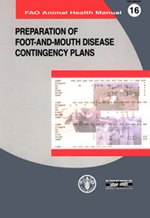
Preparation of
Foot-and-Mouth Disease
Contingency Plans
|
|
Preparation of |
FAO Animal Health Manual
No. 16
ISSN 1020-5187
Photos: FMD vaccination in Tunisia, African buffalo (Syncerus caffer), Nelore cattle in Brazil.
Overlay: Figure from Meyer, R.F., Pacciarini, M., Holyard, E.J., Ferrari, S. et al. Genetic variation of foot-and-mouth disease virus from field outbreaks to laboratory isolation. Virus Research, 32: 299-312 (1994), with permission from Elsevier Science.
William A. Geering
Consultant, EMPRES/lnfectious Diseases Group, FAO, Rome
Former Director, Animal and Plant Health,
Bureau of Resource Sciences
and Deputy Chief Veterinary Officer,
Australia
Juan Lubroth
Senior Officer, EMPRES/lnfectious Diseases Group,
FAO, Rome
FOOD AND AGRICULTURE ORGANIZATION OF THE
UNITED NATIONS
Rome, 2002
|
The designations employed and the presentation of material in this information product do not imply the expression of any opinion whatsoever on the part of the Food and Agriculture Organization of the United Nations concerning the legal status of any country, territory, city or area or of its authorities, or concerning the delimitation of its frontiers or boundaries. |
ISBN 92-5-104867-3
All rights reserved. Reproduction and dissemination of material in this information product for educational or other non-commercial purposes are authorized without any prior written permission from the copyright holders provided the source is fully acknowledged. Reproduction of material in this information product for resale or other commercial purposes is prohibited without written permission of the copyright holders. Applications for such permission should be addressed to the Chief, Publishing Management Service, Information Division, FAO, Viale delle Terme di Caracalla, 00100 Rome, Italy or by e-mail to [email protected]
© FAO 2002
ACKNOWLEDGEMENTS
ACRONYMS AND ABBREVIATIONS
INTRODUCTION
CHAPTER 1 SUGGESTED FORMAT AND CONTENTS OF A NATIONAL FMD CONTINGENCY PLAN
Nature of the disease
Risk analysis for FMD
Prevention strategies
Early warning contingency plan
Strategies for control and eradication of FMD
Organizational arrangements for FMD emergencies
Support plans
Action plans
AppendixesCHAPTER 2 NATURE OF THE DISEASE
Definition
World distribution
Aetiology
Epidemiological features
Clinical signs
Pathology
Immunity
DiagnosisCHAPTER 3 RISK ANALYSIS FOR FMD
Introduction
Principles of risk analysis
Who should carry out the risk analyses?
Risk assessment for FMD
The value of risk assessment for FMDCHAPTER 4 PREVENTION STRATEGIES FOR FMD
Introduction
Import quarantine policy
Barrier and border quarantine policy
Swill feeding controls
Containment of livestockCHAPTER 5 EARLY WARNING CONTINGENCY PLANNING FOR FMD
Introduction
Training of veterinarians and other animal health staff in early recognition of FMD and collection and dispatch of diagnostic specimens
Livestock farmer and trader awareness/education
Specialist diagnostic team
Laboratory diagnostic capabilities
International Reference Laboratories and Collaborating Centres
Special disease surveillance requirements for FMD endemic countriesCHAPTER 6 EARLY REACTION CONTINGENCY PLANNING FOR A FMD EMERGENCY
Introduction
Epidemiological features influencing FMD eradication strategies
Strategies for FMD eradication
Zoning
Stamping out
Vaccination programmes supplemented by other FMD control measures
Wild or feral animal involvement in FMD outbreaks
Public awareness and education campaigns
International requirements for the verification of FMD eradication and national or zonal freedom from the disease
International collaborationCHAPTER 7 FMD CONTROL AND ERADICATION CAMPAIGNS IN AN ENDEMIC SITUATION
Introduction
Vaccination campaigns in an endemic situation
Cessation of vaccination programmesCHAPTER 8 ORGANIZATIONAL ARRANGEMENTS DURING A FMD EMERGENCY CAMPAIGN
Responsibilities and command structures
Consultative Committee on Emergency Animal Diseases (CCEAD)
National Animal Disease Control Centre
Local Animal Disease Control CentresCHAPTER 9 SUPPORT PLANS
CHAPTER 10 ACTION PLAN
Investigation phase
Alert phase
Operational phase
Stand-down phaseCHAPTER 11 TRAINING, TESTING AND REVISION OF CONTINGENCY PLANS
Simulation exercises
Training
The need for regular updating of FMD contingencyAPPENDIXES
1. Collaborating centres
2. OIE experts and reference laboratories/ FAO reference laboratories for FMDFAO ANIMAL HEALTH MANUAL
WHERE TO PURCHASE FAO PUBLICATIONS LOCALLY
BACK COVER